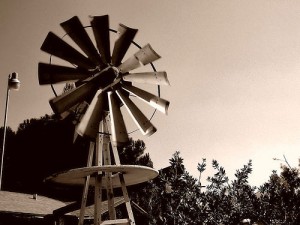
I have a theory about where the future of creative work is headed, at least in the U.S. I think it’s headed to rural areas, including farming communities.
It used to be that if you wanted to make a living as any type of creative professional, you had to go where the work was. The big cities had magazine publishers, ad agencies, film studios, art galleries and so on. There wasn’t exactly a way to ship around a catalog of the three sculptures you’ve done recently or offer up a self-published copy of your latest novel to anyone but your nearest and dearest.
But technology has absolutely changed that. Provided that you have an internet connection, you can be a freelance writer from a farm in Nebraska. You can sell sculptures from a mountain in Colorado. You can animate your own video out in the panhandle of Oklahoma. You can earn a living from your creativity from anywhere you want.
It’s All About the Connection Speed, Baby
Alright, I can admit that there are still some places where that isn’t quite as true as we’d like it to be. Sending out videos over the type of satellite internet connection you can get in the Oklahoma panhandle is not really all that feasible. Right now, the trend that we’re really starting to see is creatives of various stripes working from small cities and large towns in the Midwest, where it’s far cheaper to live than either coast — but you can still get a high-speed internet connection.
There won’t be quite as many creatives out in truly rural areas — if you can see your neighbor’s house from your porch, you aren’t in that rural of an area — until there’s high-speed internet access available out there. If you’ve heard about rural broadband, that’s the sort of change needed.
The Creative Revolution
We’ve had an Industrial Revolution, when people flocked to the cities because it suddenly got cheaper to live in urban areas and more work was available. Well, the moment that high-speed internet access hits rural communities, you’re going to see the opposite.
That’s because it’s cheaper to live in rural areas than it is to live in big cities these days. The big problem rural communities face at this point is that there just isn’t enough of the right type of work available locally, still. There often is plenty of work to get done, especially when you remember how much goes into running a farm. But there aren’t certain benefits (or at least enough money to buy those benefits) available in many jobs that can be had in a rural community. Think about health insurance. The average farm family needs health insurance just as much as the white collar worker living in New York City. But it’s a lot harder to make sure that someone in the family is working a job that provides health insurance when you have to drive an hour just to get to a town of 10,000 people.
The combination of creative work and internet connections can do a lot for this sort of situation. High speed internet access means that it’s possible for someone living in a rural area to land a job that provides health insurance that also allows for telecommuting (a category that a lot of creative work falls into). It’s also possible to build a business that makes buying health insurance on your own a lot easier. If, for instance, a member of a farming family can bring in an extra $30,000 a year through freelancing, paying for a health insurance policy can be a lot easier.
The Future of Creative Work
The ability to work from anywhere we want, on the creative projects we love, will change the world. The impact that something as simple as rural broadband might have is incredible, and something that I hope to see for myself in the near future.
Personally, I have plenty of family and friends for whom such technology will make a huge difference, if it hasn’t already. I have plenty of family members who simply live somewhere that the only internet access option is satellite connections. I’d love to see their lives made easier. And I’ve got to say that, if my work was the only constraint on where my family lived, we would be out in the boonies as fast as we could pack.
Image by Flickr user Adam Arthur